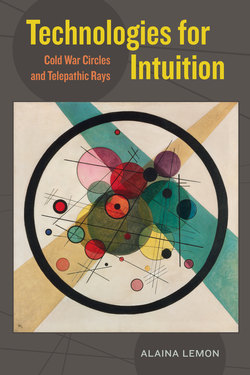Technologies for Intuition

Реклама. ООО «ЛитРес», ИНН: 7719571260.
Оглавление
Alaina Lemon. Technologies for Intuition
Отрывок из книги
Technologies for Intuition
Cold War Circles and Telepathic Rays
.....
One Moscow friend gives me an example from her teen years, around 1983, of righteous uses of opacity. After a demonstration against Soviet military force in Afghanistan, she had been taken in for a beseda (a “chat,” a euphemism for “interrogation”). She recalls feeling, “internally compelled to answer all the questions honestly,” until she realized, after comparing notes with friends, that one should refuse to answer at all, if not for one’s own sake, then for that of others in custody.11 The morality of deliberate opacity subverts dominant strands of European, Christian, Bolshevik, and modernist incitements to speak, to speak sincerely—and to speak as an individual;12 in her case, speaking truth to power would betray others. Such truthful speaking can be a cynical act, insincerely aimed. To refuse transparency along one channel—in sincere words to these people in this place—affirms other ongoing channels. For many people, and not only in Russia, this is how the “sense of trust” emerges over time, not through individually sincere expressions of referential fact. To eschew semantic transparency was less a manifestation of what has been called “a culture of dissimulation”13 and more a socially alert tactic that left room for others to navigate discursive situations otherwise out of their control. For those in such situations, American-style outrage when communication shifts, to work differently within bureaucratic corridors than outside them seems silly.14 The American NGOs that came in the late 1990s to teach Russians communication skills in lessons bundling transparency with capitalism and democracy quickly came to seem not only meddling, but naïve (see also Larson 2013; Cohen 2015a).
Many foreign consultants entered Russian spaces in the 1990s with little in the way of language or historical training, unaware of the debt that global scholarship on communication owes, in fact, to robust theories developed both in Russia and by Russian-speaking émigrés. Like Pelevin’s hero, many urban Russians had earned degrees in philology and read semiotic and literary theory (Vladimir Propp, Roman Jakobson, Mikhail Bakhtin, Yuri Lotman) and structural and post-structural theories of language in French (Ferdinand de Saussure, Jacques Derrida) and other languages. My own training in linguistic anthropology engages much of the same scholarship, and I often randomly encountered people who enjoyed speaking about concrete situations of communication in ways amenable to it (asking who addresses whom, in what social relation, for whose interests, and to which ends?) We shared ground to frame discussions about whether “democracy” always aligns with “transparency,” or whether “sincerity” (as a matter of referential truth calibrated to an individual speaking voice), is really the deepest, or best, measure of morality or for true communication, and whether it is not best to refuse the squeamishness that categories like sincerity can call into being.15
.....